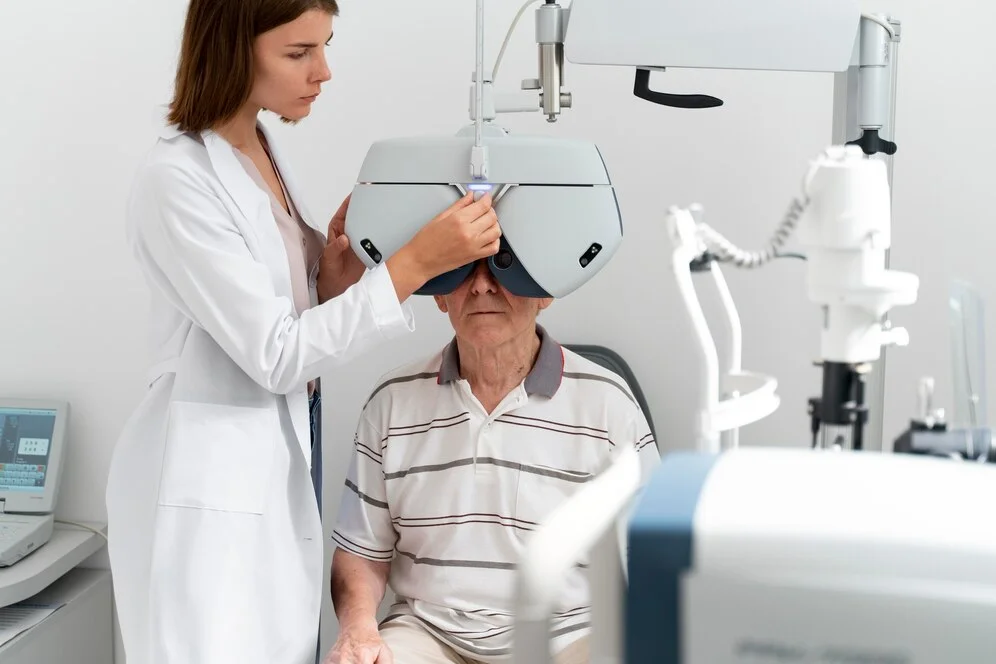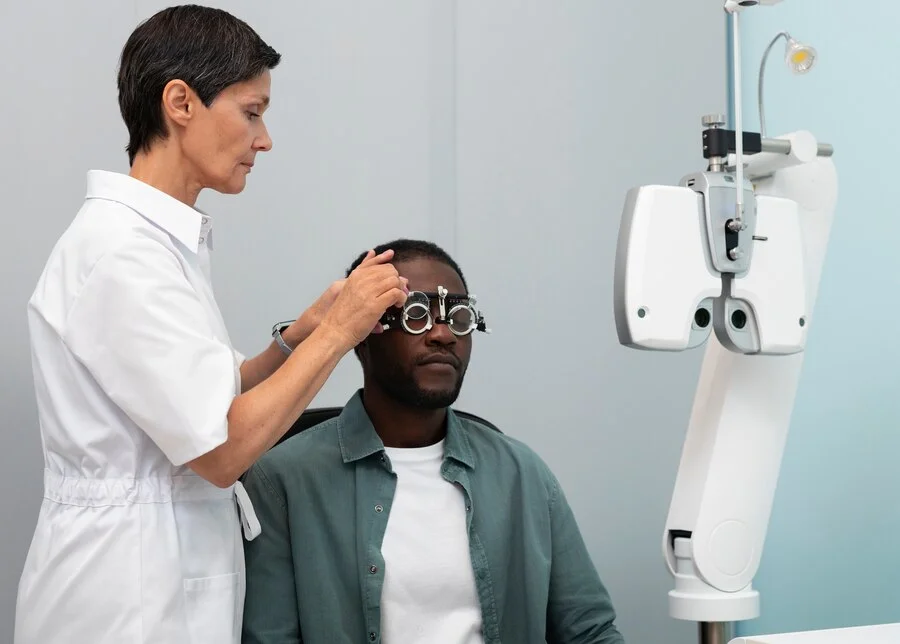Living with diabetes means managing more than just blood sugar. It also means protecting your eyes through consistent diabetes eye care. For diabetic adults, vision problems can develop slowly and silently, often showing symptoms only when significant damage has already occurred. This is why regular eye exams are one of the most powerful tools for preventing diabetic vision loss.
At Elite Eye Care, we emphasize the importance of regular eye exams as a key part of every diabetic health routine. With early detection and proper diabetes eye care, you can preserve your sight and maintain your quality of life for years to come.

The Relationship Between Diabetes and Vision
Diabetes has an impact on the blood vessels in your body, including the small delicate blood vessels in your eyes. Over time, high blood sugar can damage these blood vessels. The result of this is a group of conditions called diabetic eye disease. The most common forms are diabetic retinopathy, diabetic macular edema, glaucoma, and cataracts.
If blood sugar remains elevated for too long, the blood vessels in the retina can leak or swell, which can cause blurry or distorted vision. In more advanced cases, abnormal blood vessels can develop, leading to significant vision loss. These conditions will not get better if proper care is not taken. Many people with eye issues do not realize there is a problem until after it has caused permanent vision loss.
Why diabetic eye exams are essential
A diabetic eye exam is not the same as a routine vision test. Rather, it is a thorough assessment that will allow your eye doctor for diabetes to identify any early signs of damage to your eyes before they affect your vision.
During a diabetic eye exam, your eyes will be dilated to provide a better view of your retina and optic nerve. Dilation allows us to better notice any swelling, bleeding, or leakage of fluid that could be signs of diabetic eye disease, including diabetic retinopathy. Special testing and equipment, such as retinal photography and optical coherence tomography (OCT) can create detailed images of your retina and optic nerve to use in monitoring your condition.
Diabetic eye exams should be scheduled annually to maintain appropriate diabetes eye care. Early detection is important because once diabetic loss of vision occurs, your vision cannot always be restored.
The Importance of Regular Eye Exams for Diabetic Adults
The importance of regular eye exams goes beyond checking prescription changes. For people with diabetes, these visits can be life changing. Regular screenings help:
- Detect early signs of diabetic eye disease before symptoms appear
- Prevent irreversible diabetic vision loss through early treatment
- Track how well blood sugar management is protecting the eyes
- Provide guidance on lifestyle and treatment adjustments to protect long-term vision
Without consistent diabetes eye care, even well-managed diabetes can silently cause vision complications. Seeing an eye doctor for diabetes ensures you have a professional monitoring your eye health year-round.

Warning Signs You Should Never Ignore
Some symptoms of diabetic eye disease appear gradually, while others come on suddenly. If you notice any of these signs, schedule a diabetic eye exam immediately:
- Blurred or fluctuating vision
- Dark or empty spots in your line of sight
- Trouble seeing at night
- Colors appearing faded
- Frequent changes in your glasses prescription
These could indicate the early stages of diabetic vision loss, which can often be slowed or stopped with proper diabetes eye care.

How to prevent diabetic vision loss by consistent eye care
Following the correct diabetes eye care routine can make a difference, follow these simple steps to protect your vision:
- Control blood sugar levels: To prevent blood vessel damage, try to keep the glucose levels within the advised limits.
- Schedule eye exams: Conducting diabetic eye exams at regular intervals helps you to monitor your current condition and act accordingly with the assistance of a professional. They also help identify symptoms before they appear.
- Manage blood pressure and cholesterol: They directly impact your eye health
- Follow your treatment plans: Whether medication of laser therapy, if it is prescribed by your doctor, stick to it.
- Change to a healthy lifestyle: Add more nutrient-rich food to your meal, exercise regularly, and quit smoking.
Following these steps can reduce the risk of diabetic eye disease progression and protect your vision long-term.

How Can an Eye Doctor for Diabetes Help?
A diabetes eye doctor has expertise in identifying and treating eye problems caused by diabetes in their initial stages. They employ unique instrumentation to assist in regular retinopathy monitoring and are able to provide individualized recommendations for his or her ongoing visual plan.
At Elite Eye Care, our diabetes eye care specialists understand that diabetes presents special eyecare challenges. We develop individualized plans to help manage diabetic eye disease, prevent further complications, and enhance your vision as your disease evolves.
Protect Your Future Vision
The most effective way you can protect your vision and independence is through diabetic eyecare on a regular basis. Adverse effects can occur if you don’t prioritize routine care or notice something wrong and ignore that problem. Being proactive, however, makes all the difference.
If you experience living with diabetes, consider being proactive and make it a habit to schedule your diabetic eye exam at least the first week of January each year. Protecting your sight today means you will enjoy a clear and bright future.
At Elite Eye Care, we are dedicated to helping adults with diabetes take charge of their eye health through preventive care, early detection, and eye care.
Conclusion
Your eyes are a valuable part of your health, and you should not take their health for granted. With appropriate diabetes eye care, you can avoid the potentially serious complications associated with diabetes. Regular visits to an eye doctor for diabetes can identify early signs of diabetic eye disease, help to minimize diabetic vision loss, and protect your clear vision for the rest of your life.
At Elite Eye Care, we are firm believers that prevention is the best protection. Schedule your diabetic eye exam today and take the first step toward a lifetime of eye health.
Frequently Asked Questions
1. How often should I schedule a diabetic eye exam?
Most adults with diabetes should schedule a diabetic eye exam at least once a year, or more often as directed by your eye doctor for diabetes.
2. Can diabetic eye disease be reversed?
Some diabetic eye disease damage cannot be reversed, but early detection of diabetic eye disease through regular diabetes eye care can prevent more vision loss.
3. What are the signs of diabetic vision loss?
Signs of diabetic vision loss may include blurry vision, dark spots in vision, faded colors, and trouble focusing. Regular diabetic eye exams alert your eye doctor to changes because diabetes eye disease vision loss does not often have warning signs.
4. How is diabetes eye care different than taking the normal eye exam for glasses?
Diabetes eye care is in depth with retinal imaging to see the back of the eye, dilation, and other specialized exams to monitor diabetic eye disease before an eye disease stage or symptom developing.
